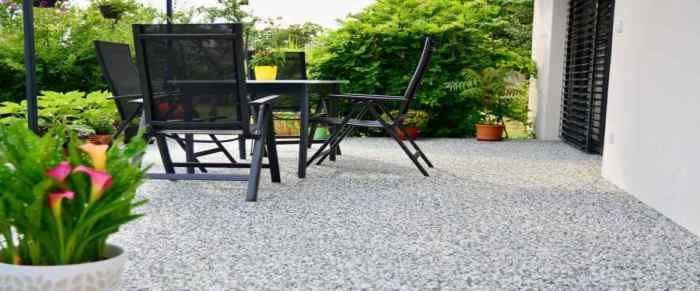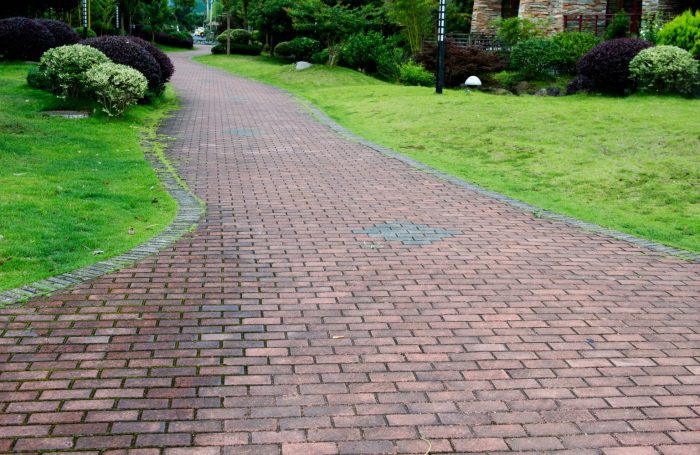Exploring the world of outdoor flooring options opens up a realm of possibilities to elevate your outdoor space. From natural stone to composite decking, each material brings its unique characteristics and benefits. Let's dive into the best choices for your outdoor flooring needs.
Providing a comprehensive guide to help you make an informed decision for your outdoor flooring projects.
Types of Outdoor Flooring Options

When it comes to selecting outdoor flooring, there are various options available, each with its own set of characteristics and costs.
1. Concrete
Concrete is a popular choice for outdoor flooring due to its durability and low maintenance. It is known for its longevity and ability to withstand harsh weather conditions. While the initial cost of installation may be higher, the long-term maintenance costs are minimal.
2. Wood Decking
Wood decking is a classic choice for outdoor flooring, offering a natural and warm look to any outdoor space. It does require regular maintenance, such as staining and sealing, to prevent rotting and warping. The initial cost of wood decking can vary depending on the type of wood used.
3. Composite Decking
Composite decking is a modern alternative to wood decking, made from a combination of wood fibers and recycled plastics. It offers the look of wood without the maintenance requirements, as it is resistant to rotting, fading, and splintering. While the initial cost may be higher than wood decking, the long-term savings on maintenance make it a cost-effective option.
4. Porcelain Tiles
Porcelain tiles are a stylish and durable option for outdoor flooring, offering a wide range of colors and patterns to choose from. They are resistant to stains, scratches, and fading, making them ideal for high-traffic outdoor areas. The cost of porcelain tiles can vary depending on the quality and design chosen.
5. Natural Stone
Natural stone, such as slate or travertine, provides a luxurious and elegant look to outdoor spaces. It is highly durable and can withstand heavy foot traffic and extreme weather conditions. The cost of natural stone can be higher than other options, but its timeless appeal and durability make it a worthwhile investment.
Benefits of Various Outdoor Flooring Materials

When it comes to choosing outdoor flooring materials, there are several options available, each with its own set of benefits. Here, we will discuss the advantages of using natural stone, composite decking, and concrete for outdoor flooring.
Natural Stone for Outdoor Flooring
Natural stone is a popular choice for outdoor flooring due to its durability and timeless aesthetic appeal. Some of the benefits of using natural stone include:
- High durability, able to withstand heavy foot traffic and harsh weather conditions.
- Natural variation in color and texture, creating a unique and luxurious look for outdoor spaces.
- Low maintenance requirements, making it easy to clean and maintain over time.
- Environmentally friendly, as natural stone is a sustainable material that does not release harmful chemicals.
Composite Decking vs. Traditional Wood Decking
Composite decking has become a popular alternative to traditional wood decking for outdoor spaces. The benefits of composite decking compared to wood decking include:
- Increased durability, as composite decking is resistant to rot, mold, and pests.
- Low maintenance requirements, as composite decking does not need to be stained or sealed like wood.
- Environmentally friendly, as composite decking is often made from recycled materials.
- Longer lifespan, with many composite decking products offering warranties of 25 years or more.
Durability of Concrete as an Outdoor Flooring Option
Concrete is a versatile and durable outdoor flooring option that offers several benefits, such as:
- High strength and durability, able to withstand heavy loads and harsh weather conditions.
- Low maintenance requirements, as concrete can be easily cleaned and sealed to maintain its appearance.
- Versatility in design, with options for stamped, stained, or polished concrete to create unique outdoor spaces.
- Cost-effectiveness, as concrete is often more affordable than natural stone or composite decking materials.
Considerations for Choosing Outdoor Flooring
When selecting outdoor flooring, there are several important considerations to keep in mind to ensure you choose the best option for your space. Factors such as climate conditions, slip resistance, and design compatibility all play a crucial role in determining the most suitable outdoor flooring material.
Climate Conditions
It is essential to consider the climate conditions of your area when choosing outdoor flooring. Different materials perform better in specific climates, so it's important to select a durable and weather-resistant option. For example, in areas with high humidity or frequent rainfall, materials like stone or composite decking may be more suitable due to their ability to withstand moisture and prevent mold or mildew growth.
Slip Resistance
Another crucial factor to consider when selecting outdoor flooring is slip resistance. Outdoor spaces are often exposed to rain, dew, or snow, making them prone to becoming slippery. Choosing a material with good slip resistance, such as textured tiles or rubber pavers, can help prevent accidents and ensure the safety of your outdoor area.
Design Compatibility
Lastly, it's essential to choose outdoor flooring that complements the overall design of your outdoor space. Consider the style, color, and texture of the flooring material to ensure it enhances the aesthetic appeal of your outdoor area. Whether you prefer a modern, rustic, or traditional look, selecting flooring that aligns with your design preferences will create a cohesive and visually pleasing outdoor environment.
Installation and Maintenance of Outdoor Flooring
Proper installation and maintenance are crucial for ensuring the longevity and durability of outdoor flooring. Different types of outdoor flooring require specific installation techniques and maintenance routines to keep them looking their best.
Installation Process for Different Types of Outdoor Flooring
- Concrete: The installation of concrete outdoor flooring involves preparing the ground, pouring the concrete mix, leveling it, and allowing it to dry and cure.
- Stone Pavers: Stone pavers are usually installed on a bed of sand or gravel, with proper spacing and leveling to ensure a stable and even surface.
- Composite Decking: Composite decking boards are typically installed using hidden fasteners for a seamless look, following manufacturer guidelines for spacing and support.
Maintenance Tips for Wood Decking
- Regular Cleaning: Sweep or vacuum debris regularly to prevent mold and mildew growth. Use a mild soap and water solution to clean the surface when needed.
- Sealing: Apply a protective sealant to the wood decking every few years to enhance its resistance to moisture, UV rays, and wear.
- Avoid Harsh Chemicals: Refrain from using harsh chemicals or pressure washers, as they can damage the wood fibers and finish of the decking.
Cleaning and Caring for Outdoor Flooring Materials
- Regular Maintenance: Sweep or rinse outdoor flooring regularly to prevent dirt buildup and staining.
- Stain Removal: Use a gentle cleaner and a soft brush to remove stains from outdoor flooring materials, following manufacturer recommendations.
- Protection from Elements: Cover or protect outdoor flooring during harsh weather conditions to prevent damage and prolong its lifespan.
Last Point
In conclusion, the world of outdoor flooring options is vast and diverse, offering solutions for every style and budget. By understanding the different materials and their benefits, you can create a stunning outdoor space that stands the test of time.
Choose wisely and enjoy the beauty of your outdoor oasis.
Essential FAQs
What factors should I consider when choosing outdoor flooring?
Consider climate conditions, slip resistance, and overall design compatibility.
How do I maintain wood decking for longevity?
Regularly clean, seal, and protect wood decking from moisture and sun exposure.
What are the benefits of composite decking over traditional wood decking?
Composite decking offers low maintenance, durability, and resistance to rot and insects.







